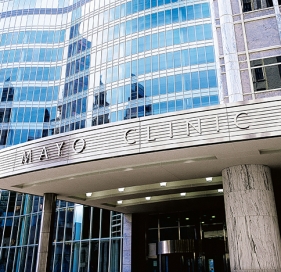Get Personalized Cancer Treatment From the Experts Revolutionizing Pancreatic Cancer Care
Mayo Clinic Comprehensive Cancer Center provides options with improved prognoses not available elsewhere for people with pancreatic cancer. We are revolutionizing the standard of care for this disease.
Nearly 2,000 people with pancreatic cancer in all stages of disease seek treatment from our cancer experts every year. Over 300 of them undergo curative surgery at Mayo Clinic in Rochester, Minnesota, so you can feel confident you are in expert hands
Pancreatic cancer typically is not caught until it has reached an advanced stage. Historically, most people with advanced pancreatic cancer whose tumors have grown outside the pancreas to involve critical blood vessels (veins and arteries) have been told their cancer is inoperable and incurable.
We have changed that.
We developed a unique and aggressive approach to treating pancreatic cancer and now offer life-saving treatment to more patients than ever before. We have redefined who is a candidate for surgery, increased survival rates and made more cures possible.
Making the inoperable, operable.
Most people with tumors that involve critical veins and arteries come to us after being told elsewhere that their cancer was inoperable. Mayo Clinic is one of the few centers in the world with highly specialized surgeons who routinely perform surgeries involving blood vessel reconstruction. In addition, we have the most experience with minimally invasive pancreatic cancer surgery.
Our pancreatic cancer team has found that customized treatment plans including personalized chemotherapy followed by radiation and complex surgery with blood vessel reconstruction can lead to excellent outcomes and a positive impact on long-term survival.
Our advanced treatment options include a wide range of surgeries, chemotherapy, radiation, immunotherapy, combination therapies and promising clinical trials. Based on your unique goals, we will help you choose what treatment is right for you.
Count on our expert team to provide accurate cancer staging and prompt treatment.
Accurate pancreatic cancer staging is critical to receiving the right treatment. As part of your initial evaluation at Mayo Clinic, you will have access to state-of-the-art imaging technology and molecular diagnostic tools, many of which are not available anywhere else in the world. Through this comprehensive assessment combined with our specialized knowledge of this disease, you can be confident you are getting the most accurate diagnosis and staging with the most appropriate treatment recommendations.
Time is critical with an aggressive pancreatic cancer. We are dedicated to getting you an appointment quickly. Your multidisciplinary team of pancreatic specialists will guide you through a comprehensive diagnostic and staging evaluation with a custom treatment plan. In some cases, this can be done with a condensed 1-to-2-day appointment itinerary.
Your team of pancreatic cancer specialists includes surgeons, radiologists, medical and radiation oncologists, endocrinologists, nutritionists and more. They work together on your case and help you choose the best treatment plan for your needs.
We are your partner throughout your journey, during treatment and after.
Whether you choose to get your complete care, including diagnosis, treatment, and post-treatment care, from our cancer team here at Mayo Clinic or you decide to receive some of your treatment near your home, your Mayo Clinic team will support you every step of the way. Your quality of life and well-being are important to us, and we will work together with your providers at home with complete transparency and collaboration.
Gain access to the latest, innovative clinical research trials.
Mayo Clinic is recognized as one of the leading centers for pancreatic cancer treatment. Our many clinical trials provide more options and hope for people with pancreatic cancer.
If you have been told curative surgery is not an option because of where your tumor is located or because of blood vessel involvement, a second opinion from the pancreatic cancer team at Mayo Clinic could expand your treatment choices and increase your long-term survival. We are revolutionizing the standard of care for pancreatic cancer and offering potentially curative treatment options to people who have been told they have none.
Contact us to request an appointment.

Rochester
200 First St. SW,
Rochester, MN 55905


Mayo Clinic Comprehensive Cancer Center is designated by the National Cancer Institute as a comprehensive cancer center.
Mayo Clinic Comprehensive Cancer Center is nationally accredited by the American College of Surgeons' Commission on Cancer (CoC).
Any use of this site constitutes your agreement to the Terms and Conditions and Privacy Policy below.
A single copy of these materials may be reprinted for noncommercial personal use only. “Mayo,” “Mayo Clinic,” “MayoClinic.org,” “Mayo Clinic Healthy Living,” and the triple-shield Mayo Clinic logo are trademarks of Mayo Foundation for Medical Education and Research.
© 1998-2025 Mayo Foundation for Medical Education and Research (MFMER). All rights reserved.
